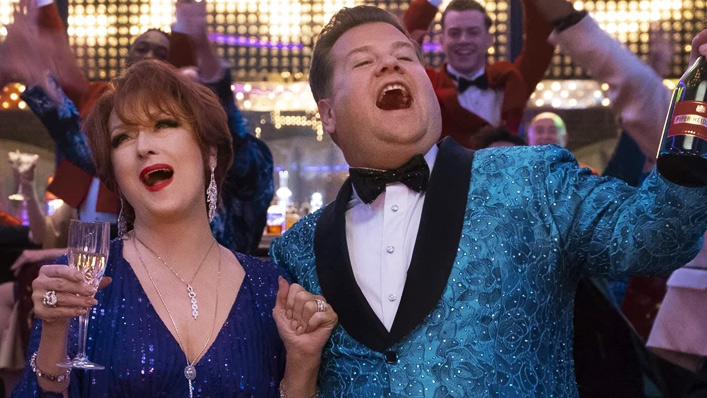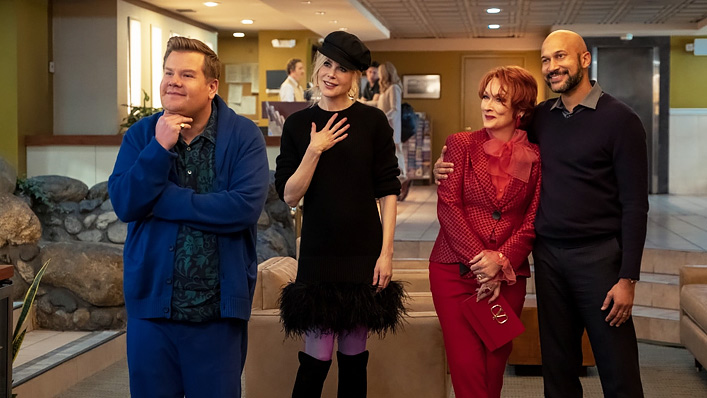The Prom is both campy and cheesy — and that’s an overpowering combination

Bright lights, fabulous clothes, Meryl Streep and James Corden singing up a storm: what could go wrong? Alas, Netflix‘s new musical (which is now in cinemas and arrives on the platform on December 11) is a mixed bag, writes critic Luke Buckmaster.
Campiness mixed with cheesiness is an overpowering combination—the knowing irreverence of the former squished by the overt sentiment of the later. We get it numerous times in director Ryan Murphy’s new Netflix adaptation of Broadway’s The Prom, including when Emma (Jo Ellen Pellman), a teenage lesbian cruelly discriminated against in her school community and told she cannot go to the titular event with her romantic partner, gets even with the powers that be by belting out a catchy song listened to by millions of people.
See also
* Best new movies & series on Netflix
* All new streaming movies & series
In this song Emma croons about how “I learned to see…this heart is the best part of me,” marking the sort of moment—and again there are numerous instances of them—that tend to be much better suited to the stage. In theatre the performances are louder, in multiple senses of the word, and theatricality is embraced as a or the presentation mode—not something that slaps you around the way it does in the movies, requiring viewers to acclimatise to its rhythms.
One cannot justifiably complain about lack of subtlety in movie musicals, or describe a performance or scene as over-the-top: they’re supposed to be. Especially when you have gaudy lights, blindingly colourful clothes and Meryl Streep and James Corden singing up a storm in a film that has “fabulous” marked in highlighter pen—or make that glitter pen. Although even sad musicals (The Umbrellas of Cherbourg, for instance) take place in weirdly heightened realities.

Directed by Murphy with stagey rather than cinematic flair, The Prom is glitzy and spritzy but inconsistent and overlong. Murphy understands it’s better to be too loud than too flat: a golden rule of musicals, and probably also of just generally being fabulous. What he doesn’t seem to grasp is that, by god, camera movements that swing around performers in circular motions—as if to say “the camera can dance too”—sure get tiresome if you use them this regularly. Because swing swing swing they do, getting in the faces and hugging the bods of haughty and self-obsessed actors Dee Dee (Streep) and Barry (Corden), who begin the film by singing about how actors change the world, how their new show will be a hit and how critics will use words like “groundbreaking” to describe it.
But this is all a setup; the punchline is that the production sucks and it gets mauled to pieces by reviewers. The pair’s publicist (Kevin Chamberlin) explains that it’s not the show, per se: “it’s you two. You’re just not likeable…nobody likes a narcissist.” So, teaming up another pair of career-driven actors (Nicole Kidman and Andrew Rannells) the couple decide that in order to salvage their image they must have a cause to get behind—a cause célèbre, as it were, and chance upon Emma’s story, deciding to visit a backwater Indiana town to make a literal song and dance.
You’re not supposed to think too much about this premise: just to understand that these stuck-up sods are doing the right thing for the wrong reasons. Or as they put it, “helping that little lesbian whether she likes it or not.” So off they trot to bring showtunes and contemporary sensibilities to the hicks of the heartland, interrupting a town hall meeting upon arrival to declare themselves “liberals from Broadway!” During the many moments when members of the troupe carve up the spotlight and break into song, you can feel the weight of the entire film behind them—the sense everything, from script to mise-en-scène, is working to amplify them and their good-natured outrageousness.
When Emma sings, however, the film is forced to lurch into earnestness, or something pretty close to it (there’ still a bit of wink-winking the audience) and thus Murphy shelves satire for sentiment. This earnestness eventually affects the big performers too, with Barry for instance wrestling with his parents and his past, including the trauma of gay conversion therapy. Heart-on-sleeve moments rub up against the campiness, creating a gloopy emotional experience that’s sincere but easy to dismiss and not particularly compelling. It doesn’t help that the film drags, with lots of flat spots—particularly those moralistic bits, and the moments leading up to them, towards the end.
The Prom is best when it’s snarky but righteous; when the moral stuff is cushioned with attitude and sass. Thus I particularly dug Love Thy Neighbour, a fun and rousing song that endorses gay tolerance by snacking on the language of the gospel, beginning by arguing “you can’t cherry pick the bible” only for a pro-gay lecture to follow that does precisely that, whacking intolerant Christians with their own scripture. It’s camp but it’s not cheesy; it’s got sentiment but it’s satirical. I would have liked to see more numbers along those lines—because it arrives too late and it’s over too soon.

















